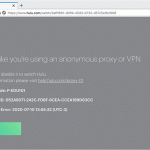VPN IP address. Shared/dedicated and static/dynamic

In this article we will approach a more complex topic and we will talk about the different types of VPN IP Addresses and their detailed features that could be considered advantageous or disadvantageous, according to one’s needs and online habits. So let’s find out more about them and see what makes them a good or a bad choice for specific kinds of users.
What is an IP address?
Internet Protocol Address, or simply put IP address is a unique set of numbers which is used to identify all the devices connected to the Internet. Indeed, every device you go online with has an exclusive number that works like an ID on the Internet. This way, you can send and receive data, without the packages skipping your address.
Until now, the IP addresses were formed from a 32-bit number that could provide approximately 4 billion unique numbers, but recently a new IP protocol was created (IPv6) that could generate limitless number of unique addresses. A classic IP number is formed by for different numbers, containing each from one to three digits separated by a dot. Each of the four numbers could go from 0 to 255.
What happens to my IP address when I’m connected to a VPN?
When you connect your device to VPN, your IP address and your location are automatically changed with the VPN server’s IP address and location. So, by using a VPN you get a new identity that you use every time you access a website for example. This means that nobody could relate your online activity with your actual IP address. Not even your ISP, or any other third party. You literally are like a masked, mysterious character that goes from one place to another without anybody tracking or identifying you.
What is a dedicated VPN IP address?
A dedicated IP VPN address is an address reserved exclusively for a single VPN client. Ok, you might say to yourself, but I’m still that incognito dude that no one knows about while browsing, right? The answer is yes you are. Still, a dedicated IP address has specific features, some of them good and some that you might not like, so let’s ask ourselves what are the advantages and disadvantages to use a dedicated IP address?
The good stuff
No neighbors, no trouble
Being the single user of a VPN IP it’s more comfortable because you will not be bothered by your trouble making neighbors. Let us explain. If, for instance, you are sharing an IP with a user that sends spams you could suffer the similar consequences, like being blocked or slowed down. This scenario is called “Bad neighbor” effect.
No risks of Trojan horses
You are sure that you are not sharing your IP with a hacker. It would be a terrible bad luck if that would happen, but it’s still a possibility and you would be more exposed to hacking attempts.
Solo means faster
It’s not always the case, but a dedicated IP could mean that you are having a faster Internet because of the larger bandwidth allocation.
The not so good stuff
Singles pay more
Like in the real world, if you want your own place, you have to pay more. A dedicated IP could go to 5 times higher than the price you would pay for a shared IP.
The same mask makes you more recognizable
Even though it’s an IP entirely different from the one that indicates your identity and your location it’s still your digital ID, because you are the only person who uses it. So, from this perspective, you are less anonymous when you go online.
What is a shared IP address?
A shared VPN IP address is used by most of the VPN users and it works like this: more users are accessing the same VPN IP to go online. Like on the dedicated IP addresses there are some pro and cons so let’s find out what are the advantages and disadvantages to use a shared IP address?
The good stuff
More privacy
In a crowd you don’t stand out. And it’s true in this case also. The browsing activity of more users relates to the same IP address, so nobody could track your activity and separate it from the others. So the more users share one IP the lesser chances to identify them.
Sharing is caring for you money
Because more people pay for the same IP address, naturally it comes cheaper for everybody.
The not so good stuff
Bad neighbors means trouble
Remember that “Bad neighbor” effect we talked about at dedicated IP addresses section? Well, on shared IPs you could take the hit. So, if one of those spam spreader bastards shares you IP, you could also take the hit for his actions. But, don’t worry. A responsible VPN provider will act fast so the bad consequences won’t reflect on you too long.
Slower by the dozen
A crowded lane could slow your traffic down. Usually this happens when there are too many people on one server with the same IP. The solution for this problem should come from the VPN provider. In most of the cases the number of users is equally divided between the IPs a VPN provider owns. So, the VPN provider should give access to enough IP’s in order for the traffic to go smoothly.
What is a static IP address?
When a device gets the same IP address for every online session it means that it has a static IP VPN address. Now that you know that, let’s hurry up and find the answer to the question what are the advantages and disadvantages to use a static IP address?
The good stuff
Remembers your online history
Let’s say that you are a passionate gamer and you subscribe using a VPN service to an online game platform. Well, you will be identified after your IP, so if you want to come back later and continue your game you definitely need a static IP address so you can be recognized. The same thing applies for other subscription based websites.
Keeps you connected
Also, if you are in the habit of accessing remotely your home computer it’s easier to do it with a static IP. There is no risk of the IP changing during the time you are connected and a single IP it’s easier to remember and use when you are away from your home device.
The not so good stuff
Doesn’t take everywhere in the same time
If you need, for some reason, to connect each time to a new IP address and your VPN provider doesn’t have enough servers, you won’t be able to succeed with a static IP Address. But besides this particular and rare situation, your static IP VPN Address won’t give you any troubles.
What is a dynamic IP address?
A dynamic VPN IP Address provides different IP Addresses every time a device goes online. There’s still a possibility that the user will get the same IP Address because some networks and ISPs change the IP Address from time to time and not at every connection. But let’s find out what are the advantages and disadvantages to use a dynamic IP address?
The good stuff
Start fresh
There are situations where you don’t want to be recognized by the websites you visit, and usually is because you want to start as a fresh user and create a new account. For example, it applies in gaming where you could be a new player only with a dynamic IP.
Harder to track
Also, you can’t be found by a hacker who tries to target you in more than one session.
The not so good stuff
Slower downloads and uploads
For a normal user, meaning that you are not trying to create or host servers there are no significant disadvantages of using a dynamic IP addresses. Still, they are known to be a little slower than static IP addresses, but, for day to day browsing, the difference is not noticeable.
Remembers your online history
Not your best friend when it comes to scorekeeping. If you want to return to your account from a game platform, your game progress will not be remembered and you would have to start over, like every time. Because, for the online platforms, a dynamic IP Address means there’s a new face every time you come back. Not fun at all, we know.
Always a stranger to your home desktop
Trying to access remotely your home computer might be trickier than you think, because your IP might change during your connecting session. More than that, you would have to constantly write down the IP from time to time, as you can’t possibly know how long an IP stays with you, or when you are getting a new one, in order to use it for remote access.
Need a Reliable VPN Service?
We here at SmartyDNS offer high-speed VPN servers with military-grade 256 bit AES encryption and highly-secure VPN protocols (OpenVPN, SoftEther and IKEv2) and we adhere to a strict no-log policy.
Our VPN servers double as proxy servers and we also offer a Smart DNS service that lets you unblock 300+ worldwide geo-restricted websites.
We offer user-friendly VPN apps for Windows, Mac, iPhone/iPad, Android, and Fire TV/Stick and browser extensions for Chrome and Firefox.
Special Deal! Get SmartyDNS for $3.7/mo!
Oh, and we’ll also have your back with our 30-day money-back guarantee.
Conclusion
From now on, you can definitely say that you know a lot more about IP addresses and what are they for. As you learned from this article there is no firm recommendation about the type of IP address you should choose. It all depends on your browsing habits or online needs and those may very well change in time. But whatever you’re choosing make sure that you know the pros and cons so you will get the most benefits either they are cost, safety or speed related.




